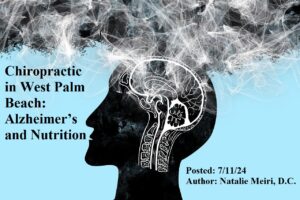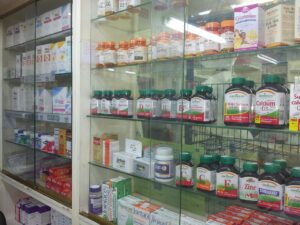
Chiropractic in West Palm Beach: Alzheimer’s and Nutrition is about nutritional supplementation and lifestyle changes to help Alzheimer’s Disease.
Dementia is the name for a group of symptoms associated with an ongoing decline of brain functioning. And Alzheimer’s Disease is the most common cause of dementia in the United States. It accounts for approximately 65% to 75% of all cases. In fact, there are more than 4 million Americans affected by Alzheimer’s. Furthermore, it appears women live longer than men with Alzheimer’s and so represent twice as many cases. The combined cost of direct management and lost productivity is at least $100 billion annually. In fact, the National Institute on Aging estimates that as many as 5 million Americans over the age of 65 have some form of Alzheimer’s disease. In its latest statement, the Alzheimer’s Association states that “as many as one in three older people will die from Alzheimer’s disease or dementia in the United States”. And more and more patients are afraid of losing their memory.
While there is no cure for Alzheimer’s disease, there are things you can do to maintain your cognitive health as you get older in regard to cognitive dysfunction.
What is Alzheimer’s Disease?
It is a progressive condition, which means the symptoms develop gradually over many years and eventually it severely affects multiple brain functions. The first sign of Alzheimer’s disease is usually minor memory problems. For instance, this could be forgetting about recent conversations or events, and forgetting the names of places and objects. Next, common symptoms include memory loss, concentration problems, confusion with familiar tasks, difficulty communicating, mood changes, and anxiety. Finally, the stages of Alzheimer’s disease leads to increased mental and physical deterioration until eventually the person needs 24-hour care.
Scientists think Alzheimer’s disease is caused by the abnormal build-up of proteins in and around brain cells. These deposits (amyloid) form plaques around brain cells. Yet another protein (Tau) deposits in tangles within brain cells. Although it’s not known exactly what causes this process to begin, scientists now know that it begins many years before symptoms appear. Lastly, neurotransmitters (chemical messengers) are decreased so brain signals/messages are not sent.
Risks for developing Alzheimer’s Disease
Firstly, age is the single most significant factor. The likelihood of developing Alzheimer’s disease increases after you reach 65. However, early- or young-onset Alzheimer’s disease can affect people from around the age of 40.
Secondly, the genes you inherit from your parents can contribute to your risk of developing Alzheimer’s disease. Nevertheless, the actual increase in risk is small unless you have a specific single gene. Then the risk is much higher.
Thirdly, if you have Down’s Syndrome, suffered head injuries, hypertension, diabetes and/or have cardiovascular disease you are at a greater risk.
Fourthly, you can lower your risk by: not smoking/avoiding second hand smoke, eating a healthy diet and loosing weight if necessary, leading an active life mentally and physically, avoiding excess alcohol/drugs.
Fifthly, the latest research shows that factors that increase the risk also include: hypertension, hearing impairments, social isolation, untreated depression, toxins/air pollution.
More on Alzheimer’s Disease
As mentioned above, those patients with a genetic predisposition are more at risk. Moreover, in combination with atherosclerosis, peripheral vascular disease, or diabetes mellitus they are at a substantially higher risk of cognitive decline.
Hyperhomocysteinemia is a medical condition characterized by an abnormally high level of total homocysteine in the blood. Homocysteine is an amino acid produced when proteins are broken down. High homocysteine levels usually indicate a deficiency in vitamin B-12 or folate. So nutritional deficiencies seem to be a cause. The B vitamins are important in cognitive functioning. And it is well known that the processed foods constituting so much of the modern diet have been stripped of these essential nutrients.
Lastly, the diagnosis of Alzheimer’s disease is both one of exclusion and inclusion (diagnosis that is left over after all other possible differential diagnosis are ruled out).

Helpful Supplementation/Nutritional Recommendations for Alzheimer’s Disease
Acetylcholine- Acetylcholine is a neurotransmitter which works by sending signals between nerves. Choline supplements are your best bet for raising acetylcholine levels
Acetyl-L-carnitine– an amino acid, helps brain function and reduces degeneration of memory
Boron- improves brain function
Coenzyme A- assists body in eliminating many toxins
Coenzyme Q10- for energy to cells
Folic acid– Aids in controlling homocysteine level balance
Iron– Deficiency should be checked by physician
Lecithin– (mixture of fats)- helps memory
Multivitamin and mineral complex – all nutrients are necessary for optimum body function
Phosphatidyl serine– Improves memory.
Pycnogenol or grape seed extract– Protects brain cells from free radical destruction
S-Adenosylmethio- nine (SAMe)- Lowers homocysteine levels.
Selenium- Acts as antioxidant for brain cell protection.
Trimethylglycine (TMG) –Assists the body in utilizing vitamin B12, folic acid, and vitamin B6. It also helps to body detoxify (e.g. homocysteine) and increases levels of the natural mood enhancers such as S-adenosyl-methionine.
Vitamin A plus carotenoids (including beta-carotene) and vitamin E- protects against antioxidant damage
Vitamin B complex plus extra vitamin B6 (pyridoxine) and vitamin B12 or vitamin B complex plus extra pantothenic acid (vitamin B5)-Needed for brain function and seen lacking in people with Alzheimer’s disease. Deficiency can lead to depression, memory and mental difficulties.
Zinc– Excellent immune system stimulant.
Apple Pectin– great for removing toxic metals (e.g. mercury) which may lead to Alzeimer’s
Calcium and Magnesium- calms the nervous system
Free-form amino acid complex– for tissue repair and brain function
Kelp- supplies minerals needed for body
Melatonin- aids sleep while improving brain function
Superoxide dismutase– strong antioxidant
Vitamin C and bioflavonoid– increase immune function and level of energy
Herbs- Butcher’s broom promotes healthy circulation. Ginkgo biloba increases blood flow to the brain. Studies indicate Ginkgo helps mental functioning for Alzeimer’s patients. Kava kava and St. John’s wort help to calm emotions. Studies suggest that curcumin (a compound in turmeric) and rosmarinic acid inhibit the formation and extension of beta-amyloid fibrils, and destabilize existing beta-amyloid plaques. Rosmarinic acid is a plant phenolic (dietary polyphenols, natural antioxidants) that is present in significant quantities in oregano, sanicle, gypsywort, rosemary, marjoram, the mints, and sage. Chinese herb qian ceng ta (Huperzia serata) or club moss increases memory retention. Valerian root improves sleep. Balm and sage may contribute positively to brain chemistry. Cat’s claw, when mixed with other herbal extracts (such as ginkgo, gotu kola, and rosemary), inhibits the buildup of plaques in the brain.

Diet/Lifestyle Changes for Alzheimer’s
First, it’s crucial to keep active and intellectually involved. Continue to learn as well as get plenty of exercise. Second, have allergy testing performed for any possible environmental and/or food allergies. Third, avoid alcohol, cigarette smoke, processed foods, and environmental toxins, especially metals such as aluminum and mercury. Smoking more than doubles the risk of developing dementia and Alzheimer’s disease. And all metals in excess are toxic to the body. Fourth, Do not drink tap water. Drink 8 glasses of good quality water. Herbal teas will suffice as well.
Regular exercise throughout adulthood can reduce the chances of developing Alzheimer’s disease. Try biking, walking, swimming, and/or golf. Research shows that walking three times a day improves brain function and reduces the risk of Alzheimer’s disease. In addition, people who tend to experience psychological distress appear to be more likely to develop Alzheimer’s disease versus those who are less prone to experience distress. It’s important to learn to de-stress through meditation or some relaxation technique. Similarly, people who most often had negative emotions such as depression and anxiety were more likely to develop Alzheimer’s then those who were less prone to negative emotions.
Chiropractic in West Palm Beach and Your Nervous System/ Brain
As chiropractors, we believe in the concept of wellness for our patients and we recognize things like receiving chiropractic adjustments, exercising, eating healthy/good nutrition and sleep hygiene as important parts of a wellness program. Such a wellness program will certainly lower your risk of developing Alzheimer’s disease.
Even if you don’t have a family history of Alzheimer’s, as you age, your nerve cells lose speed and flexibility. You might start forgetting more and remembering less.
Finally, this is where your chiropractic adjustment comes in. Getting regular adjustments to get your body aligned keeps your nervous system which your brain is part of, functioning at it’s optimum!
Contact your Chiropractor in West Palm Beach at 561-253-8984 today to make an appointment or to learn more about Chiropractic in West Palm Beach: Alzheimer’s and Nutrition.
References: Handbook of Preventative and Therapeutic Nutrition by James M. Gerber,M.S., D.C.
Prescription for Nutritional Healing (3rd edition), Phyllis A. Balch, CNC
Thomas Souza, (2018) Differential Diagnosis and Management for the Chiropractor
*Please consult your doctor (M.D.) who is managing your condition in regards to the above supplements.